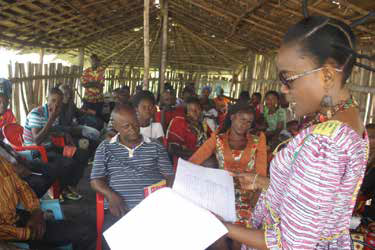
Description of the project: CFLEDD strives for the recognition of women’s land and forest rights in the provinces of Equateur and Maindombe of the DRC, with the aim to strengthen their effective participation in reducing deforestation. An advocacy tool has been built and is used in dialogues between local and indigenous women, customary chiefs and provincial authorities. Recommendations resulting from these dialogues have led to the adoption of 2 provincial edicts that guarantee land and forest rights for women. This transforms the country’s patriarchal framework, while strengthening the role and decision-making power of women in DRC’s forest management policies for climate action.
Climate impact: Halting deforestation is a key issue for effective climate action, thus all members of society should be able to contribute to it. For indigenous and pygmy indigenous women, traditionally in charge of farming in the forest, and therefore of protecting of this endangered ecosystem, the recognition of their land and forest rights is an essential condition of their active participation in forest governance, and therefore in the fight against climate change.
Gender impact: According to a study conducted by CLFEDD in 2016, 70% of women in the DRC do not have access to land and forest titles. Their capacitation via training in advocacy and leadership and the formalization of their rights through legal texts, enable local and indigenous women to play an active role in forest governance. All power levels, customary chiefs, administration, legislature, executive, and judiciary, are aware and have committed through legal texts to guarantee gender equality and to protect the rights of women.
Scalability / replicability: The concept of peaceful dialogues as an advocacy tool, supported by female leadership, form the basis of a replicable model. Women leaders, trained and mobilized, become actors of transmission and sustainability. CFLEDD Focal Points provide on-the-ground follow-up, working closely with local authorities and provincial assembly presidents. Information and awareness raising is broadly relayed by community radios.